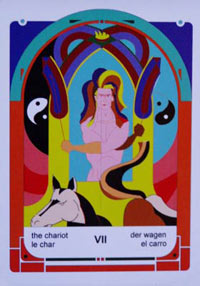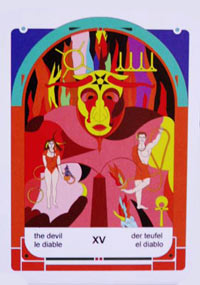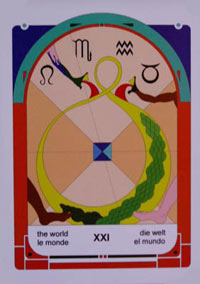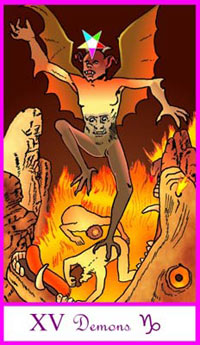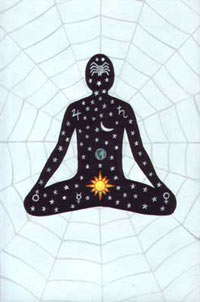Below each descriptive paragraph, there are small samplings of each deck. For comparison, these selections include the following cards: The Chariot, The Devil, The World, King of Pentacles, Ace of Wands, 3 of Cups, 6 of Swords, and 8 of Pentacles.
Tarot in the Land of Mystereum
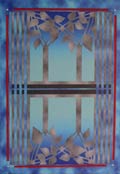
by Jordan Hoggard
Tarot of the Masters
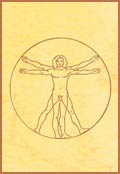
by James Ricklef
Langustl Tarot
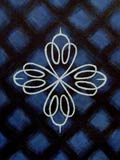
by Stephan Langustl Lange
bifrost Tarot
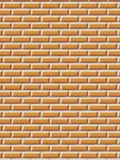
by Jeremy Lampkin
Duncan-Streeter
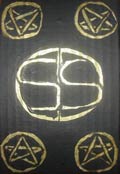
by Duncan & Streeter
The first deck, Tarot in the Land of Mystereum is exactly what the title implies – mysterious. The deck seems to be based mostly upon the whims of its artist, Jordan Hoggard’s unconscious thoughts. Without much of a traditional framework to base its understandings upon, the intention of this deck seems to be to get readers to take a stroll through their own unconsciousness, perhaps in order to become more in tune with their imaginations. The lack of much traditional structure forces readers to rely on intuition. Naturally, using this deck helps readers develop this psychic ability.
|
|
|
King of Pentacles
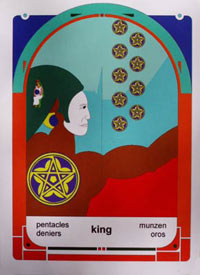 |
Ace of Wands
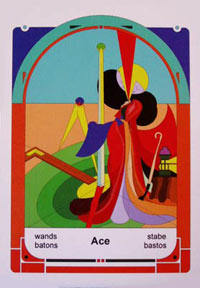 |
3 of Cups
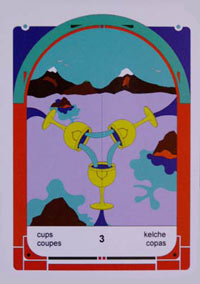 |
|
|
|
6 of Swords
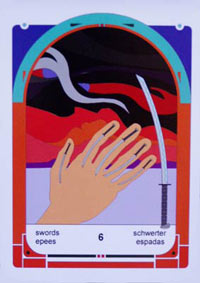 |
8 of Pentacles
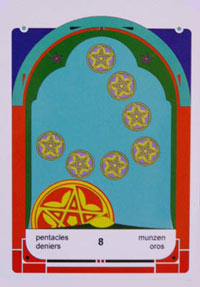 |
|
The second deck, Tarot of the Masters is an interesting twist on the classic Rider-Waite tarot deck. Artist James Ricklef based this deck on the works of famous old masters of painting, including the likes of Toulouse-Lautrec, Rubens, and Bosch. He browsed through hundreds of their works in order to find concepts that matched his vision of the Waite-style 78-card tarot deck. Instead of simply mashing their works together and calling it a day, he took it upon himself to re-draw their visions, giving his deck the sense of both unity and diversity at the same time.
|
|
|
King of Coins
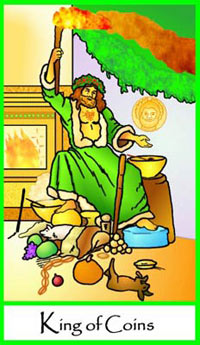 |
Ace of Wands
 |
3 of Cups
 |
|
|
|
6 of Swords
 |
8 of Coins
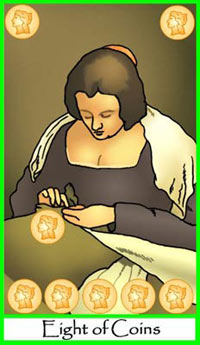 |
|
The Langustl Tarot by Stephan ‘Langustl’ Lange was based on a combination of Aleister Crowley’s Book of Thoth and the Rider-Waite-Smith deck by A. E. Waite. The Minor Arcana of this deck contain what seem to be traditional pip cards, meaning they are not depictions of scenes like RWS-inspired decks, but instead show simple numbered pictures of the suit’s avatars. On the other hand, the Majors were apparently more inspired by the Rider-Waite. Langustl’s cards are brilliant, vibrant close-up representations which capture the essence of the core elemental energy of each card of the deck with intense focus. As extreme close-ups, even the trumps have a pip-like energy about them, and this reveals that the Minors were actually more RWS-inspired than they appear to be. The unique character of this deck lies in its expressive style, which show Lange’s appreciation of the fact that everything in the universe is characterised by its own unique vibrations.
|
|
|
King of Coins
 |
Ace of Wands
 |
3 of Cups
 |
|
|
|
6 of Swords
 |
8 of Coins
 |
|
The fourth deck, bifrost is similar to Langustl in that it is also a hybrid of Thoth and Rider-Waite influences. The deck’s artist, Jeremy Lampkin came to realize that he wanted to become an artist only after creating this tarot deck, which was done in honour of the traditions of the old mystery schools of the occult. After the completion of one of the highest rites of initiation, it is customary to design, or at least to re-draw a tarot deck to be the occultist’s personalized tarot, a representation of his own understanding of the universe. Understanding that everything must have its equal and opposite balance factor (which is often mistaken for hypocrisy), Lampkin saw the tarot deck as a holistic opportunity to reunify many seemingly disparate forces.
|
|
|
Knight of Disks
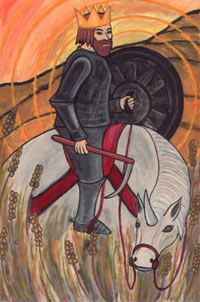 |
Ace of Wands
 |
3 of Cups
 |
|
|
|
6 of Swords
 |
8 of Disks
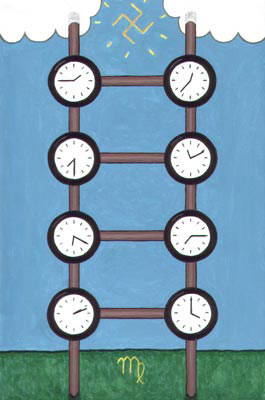 |
|
Warning: Simulated Gore
Duncan-Streeter
The Duncan-Streeter Tarot by Charles Vick Duncan and Melissa Streeter has a vampire theme influenced by a combination of Nosferatu and Vlad the Impaler. Despite its graphic use of gory scenarios on the stakes, swords, and cups suits, the deck’s message is not about violence – the card meanings actually do not deviate too far from standard Rider-Waite meanings. While many tarot decks have been made with vampiric themes, this deck stands apart from the “dark” or “gothic” mood of most vampire decks. The mood of this deck is more upbeat, more like a gory horror-comedy film. Hardcore fans of this genre may like to check out Duncan’s films, as he is not just an artist who has done over 1000 paintings, but also a film director. On the other hand, those who do not like vampires, horror, or gore should be warned that this deck is probably not for them.
|
|
|
King of Pentagrams
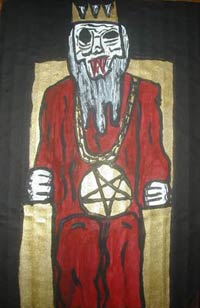 |
Ace of Wands
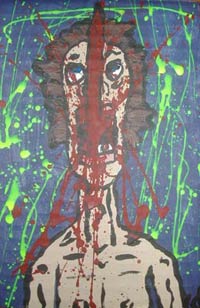 |
3 of Cups
 |
|
|
|
6 of Swords
 |
8 of Pentagrams
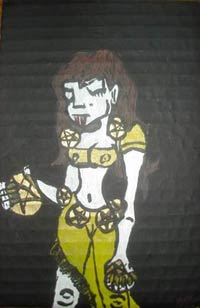 |
|
Tarot in the Land of Mystereum Copyright ©2010 Jordan Hoggard
Tarot of the Masters Copyright ©2008 James Ricklef
Langustl Tarot ©2008 Stephan Lange
bifrost Tarot ©2007 Jeremy Lampkin
Duncan-Streeter Tarot ©2010 Charles Vick Duncan & Melissa Streeter
